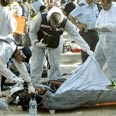
U.S. sheriffs learn from Israel
Former top U.S. counterterrorism official tells Ynet about growing demand for Israeli expertise. ‘The most important thing in the war on terror is intelligence,’ Steve Pomerantz says
Mickey Levy, the police attache at the Israeli Embassy in Washington is probably one of the busiest people in the U.S. nowadays.
As American interest in cooperation with Israel on homeland security issues continues to grow, Levi is traveling coast to coast and sharing his experience as Jerusalem's police chief during four years of intifada with police officials and local sheriffs.
Levi isn't alone. The phones at the office of Israeli Embassy Spokesman David Segal are ringing off the hook.
"The media is very interested in the cooperation between the two countries," Segal said. Indeed, the subject received extensive coverage lately in the the Washington Post, New York Times, public radio and on cable TV.
The Sun Francisco Chronicle, for example, interviewed Santa Clara District's Sheriff, Lori Smith, who visited Israel in April. Smith was impressed with Israeli security forces' sharpened senses, as evident during security screening at the airport.
"They developed a very good psychological profile of a suicide bomber," she said.
Smith visited Israel with a group of U.S. law enforcement agents who came to learn Israeli counter-terror tactics.
The best known American institute addressing the issue may be the Jewish Institute for National Security Affairs (JINSA) established following the 1973 Yom Kippur War.
JINSA's mission is to elucidate the important role Israel can play in bolstering American interests as well as the link between American defense policy and the security of Israel. Following the September 11 attacks, JINSA developed a program that allows Israel and the U.S. to share information and expertise.
Some 40 police officials and U.S. sheriffs arrived in Israel since 2002, including high ranking officials from the FBI and the DEA. 1,500 participated in the institute's various programs and heard Israeli representatives, including mall security officials, and police and prison service personnel.
'Unfortunately, you’re the experts'
Steve Pomerantz, Former Head of the FBI's counterterrorism section and presently a Fox News analyst and JINSA director, told Ynet that it is not necessarily the FBI that is in need of Israeli assistance in gathering intelligence about terror activities and developing action plans, but rather, local police officials and sheriffs who man the frontlines.
Overall, there are about 18,000 police departments across the U.S., each responsible for terror prevention, intelligence gathering and response to incidents taking place in the area under its jurisdiction. According to Pomerantz, low ranking law enforcement personnel, on the ground, should be the first to pick up signs of terrorist activities.
"The problem is they have no training," he said, and added this was the reason police officials were looking to their Israeli colleagues, who understand the importance of the first responders' role in saving lives and gathering evidence.
Before September 11, law enforcement agencies were not sharing intelligence and local police departments were not privy to classified terror-related information, Pomerantz said.
“Unfortunately, you’re the experts when it comes to that,” he said.
Indeed, when it comes to fighting terror, there is no greater expert than Mickey Levy.
“I follow police commanders who listen to Mickey Levy’s lectures,” Pomerantz said. “I was in a room with 500 police commanders when Mickey spoke about an incident where he ordered to shoot a suicide bomber. There was complete silence. You know what each one of those commanders is thinking…what would I do in this kind of situation? It could be me.”
“Today everyone understands sharing intelligence is a must,” he says, but adds that while some police commanders would say the situation has improved and relations with the FBI were boosted, others would say the state of affairs remained largely unchanged.
In conclusion, says Pomerantz, the bottom line remains good intelligence.
“This is the most important thing in the war on terror,” he says. “Intelligence, intelligence, intelligence.”










